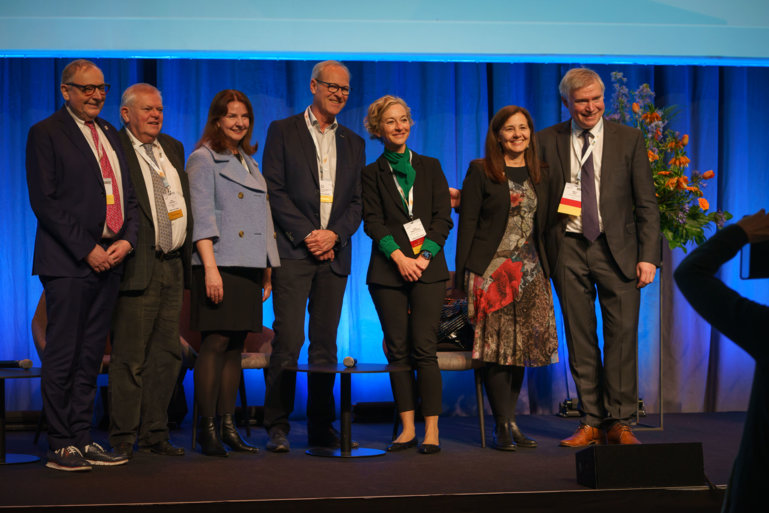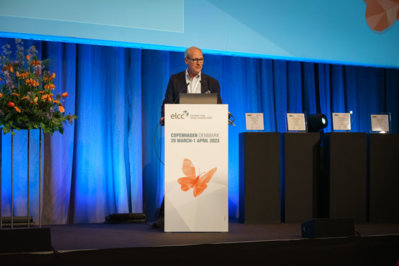Recipient of the Heine H. Hansen Award 2023, Prof. Paul Baas charts the course of mesothelioma treatment over the last 30 years and warns that progress has been made only in some areas of the world
Despite great strides in its management in recent times, Prof. Paul Baas believes that the oncology community cannot rest on its laurels as mesothelioma still hits hard in countries where asbestos controls are lacking. Professor of Thoracic Oncology at the Netherlands Cancer Institute (NKI), Baas is the 2023 Heine H. Hansen Award recipient for his contribution to transforming the understanding and management of this lung-cancer malignancy – the journey of which is outlined in his Keynote Lecture, ‘Mesothelioma treatment: From hopeless to hopeful’ at the European Lung Cancer Congress 2023 (Copenhagen, 29 March–1 April).
How far has treatment for mesothelioma progressed?
Nearly 25 years ago, it was clear that Europe was facing a mesothelioma epidemic (Br J Cancer. 1999;79:666–672) and yet we had no effective treatments. Despite testing a variety of single agents and some combination therapies, rates of response were poor and response duration was relatively short. The situation began to turn around in 2003, when addition of the antifolate, pemetrexed, to cisplatin was shown to improve the response of malignant pleural mesothelioma (MPM) (J Clin Oncol. 2003;21:2636–2644) and this approach became the standard of care for the next 12 years or so. However, the real breakthrough came with the introduction of immunotherapy, culminating in 2021 with the regulatory approval in Europe and the USA of nivolumab plus ipilimumab for the first-line treatment of unresectable MPM, based on the results of the phase III CheckMate 743 trial (Lancet. 2021;397:375–386), on which I was a lead investigator. The effects were particularly striking in non-epithelioid mesothelioma, with an almost doubling of survival in a notoriously challenging disease that had until then failed to respond to other treatment approaches. The combination has now become standard of care in this disease. The efficacy of immunotherapy means that we now have a choice of treatments for our patients. While immunotherapy may often be the preferred option, not least because it can be administered long term, patients with contraindications to this approach can still derive benefit from chemotherapy. In addition, where a rapid tumour response is required, chemotherapy can be used in advance of immunotherapy.
What new treatment approaches are being investigated for mesothelioma?
Building on the success of immunotherapy, studies have been looking at combinations of immunotherapy with cytotoxic chemotherapy and with other agents. Promising combination partners may be antiangiogenic agents, such as lenvatinib or bevacizumab, which appear to enhance the immunogenicity of the tumour microenvironment. A challenge for immunotherapy is determining who is most likely to benefit from treatment and so we need biomarkers to define these patient groups. Beyond immunotherapy, molecularly targeted approaches are being investigated, for example, looking at mutations in the BAP1 tumour suppressor gene, finding new ways of interfering with aberrant hedgehog signalling and studying the effects of epigenetic modifications. One avenue being explored is the modulation of ‘old’ cytotoxic drugs, like doxorubicin. Molecular modification of doxorubicin leads to retention of its cytotoxic activity via histone eviction but without the limiting side-effects, such as cardiotoxicity, caused by its DNA-damaging effects. This approach has shown some promise in preclinical studies.
What immediate challenges lie ahead for mesothelioma?
We have made great strides in the management of mesothelioma but we cannot rest on our laurels. There is still such a lot be done, particularly in prevention. Asbestos continues to be mined in huge quantities and exported to developing countries and one of the tasks I am currently undertaking as Chairman of the International Association for the Study of Lung Cancer’s Mesothelioma Task Force is to oversee an initiative looking at the ways in which these countries manage mesothelioma. As part of this initiative, we want to understand how physicians in countries with fewer resource restrictions can provide assistance to those in resource-constrained settings, for example, in helping to educate about latest scientific findings in mesothelioma or providing guidance on setting up patient registries.
Even in well-resourced countries there is considerable room for improvement in supporting patients, not just in a medical capacity, but also regarding legal and socioeconomic issues. The UK’s national charity, Mesothelioma UK, is doing an excellent job in this respect and I would like to encourage colleagues in other countries to develop similar resources.
Don't miss:
Opening Session and Heine H. Hansen Award 2023
Mesothelioma treatment: From hopeless to hopeful
Keynote Lecture, 29.03.2023, h. 13:30 – 14:15, Auditorium 1
Mesothelioma: From biology to novel treatment strategies
Educational session, 29.03.2023, h. 14:30 – 16:00, Auditorium 4
Abstracts presented at ELCC 2023:
Mohamed Shawqi M et al. Clinical and Epidemiological Patterns of Pleural Mesothelioma in the United States: Long-Term Data from SEER Database. Abstract 134P
Ellaithy A. Macroscopic complete resection versus non-surgical management for malignant pleural mesothelioma. Abstract 135P
Nadal E et al. Germline testing in a cohort of malignant MESOthelioma (G-MESO). Abstract 136P
Laure A et al. Repurposing drug screen of patient-derived malignant pleural mesothelioma cells reveals potential anti-cancer activity. Abstract 137P
Barbier MC et al. Cost-effectiveness of nivolumab and ipilimumab versus chemotherapy (with and without bevacizumab) in patients with unresectable malignant pleural mesothelioma in Switzerland. Abstract 138P
Emam Sobeih MS et al. Gemcitabine As Maintenance Treatment Of Malignant Pleural Mesothelioma (GEMO): Randomized Phase II Study. Abstract 139P
Poster display session, 31.03.2023, 12:00 - 12:45, Exhibition and Poster area


